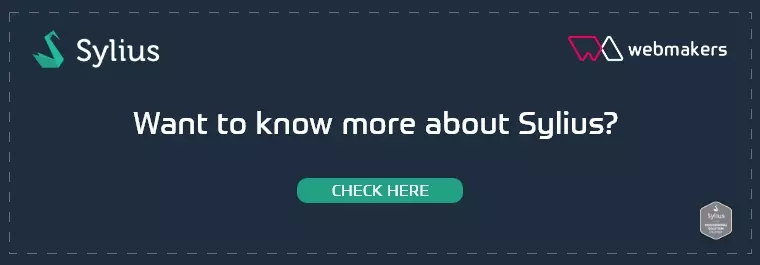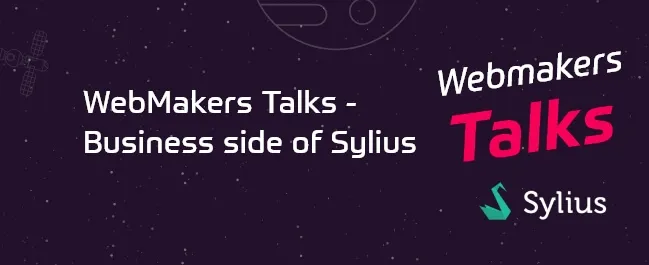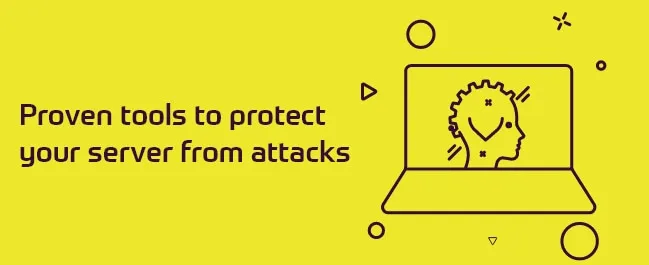
Webmakers talks technical side of Sylius
In the next episode of our WebMakersTalks series, Damian spoke with Pawel Jedrzejewski - CEO of Sylius. Our interlocutor touched mainly on technical topics - we asked, among other things, about the most interesting problems reported, the community that the platform gathers, and whether Sylius can be used in projects beyond e-commerce.
Hi, this is Damian from WebMakers. I'd like to welcome you to our WebMakers Talks series. With me is Pawel Jedrzejewski CEO of Sylius.

Hi Pawel.
Hi Damian.
Today we are going to talk about technical topics related to your system. As we know, e-commerce is a very large and vast market. There are many platforms and different systems. My first question is: how do you find your way in this market? What is your biggest technical differentiator in Sylius that developers value you the most and have come to love you the most for?
I think such a most important differentiator is that Sylius is based on the Symfony framework. This is the niche that we come from. Symfony is a very popular framework for web applications and Sylius is one of the first e-commerce projects to be based on this engine. I think this strongly sets us apart and Symfony developers feel at home working with Sylius.

And what are some of the biggest stores you've heard about put on your system and did it involve any problems, bottlenecks that you had to face?
We, as a vendor, are responsible for product development and rarely clash with such problems directly at the customer's site. Usually, it is our implementation agencies that have interesting stories to tell. We, on the other hand, know of a few projects in Poland. From B2C it would be, for example, Your Kaya, from B2B it would be our Lodz-based TME, about 500 thousand products - an e-commerce platform in China.
In what way did they report to you? And they told you, for example, that Sylius wasn't quite coping with something and expected some help from you?
Yes, every day we get information about some potential improvements, bugs and so on. So, all the time this flow of information especially because of open source is there.
And I understand that later on it is implemented on an ongoing basis by the community or directly by your internal team.
Both by the internal team and the open-source core team and by contributions from the community. So, we have these three channels through which patches and improvements for Sylius flow from these three sources.
Could you talk about the most interesting, unusual technical issues that have been reported to you?
Certainly, a niche for Sylius is all kinds of configurators. We have configurators for fences, configurators for conference stands, configurators for chocolate, lenses, glasses, floor panels - these types of implementations are there. What you don't come up with, it was usually already done on Sylius. Also, these are such interesting cases.
So it's a matter of such customization, preparation of this configurator. And do you often have that there are rumors that some zero date so called has arisen and it needs to be patched as soon as possible, make a fix. Do you get such signals and if so, how do you react to it?
Rarely. Our paying customers have access to technical support as part of the Sylius Plus package, and maybe a few times we've received such a rather urgent notification related to, for example, stock levels that went completely awry after some customization, yes. These types of requests are from paying customers. When it comes to open source and what's flowing from the community, there's rarely anything urgent.
And has there ever been just such a problem of a more security nature, that someone reported that there was some serious vulnerability that prevented logging into someone's account?
Not that serious, while we have issued several security patches that were the result of bugs reported by the community. We have a special address security@sylius.com where you can confidentially send a report about just such a bug or some potential security vulnerability.
This just proves that Sylius is well secured and well written here, since you don't have that many such problems.
This is interesting in the context of open source. I always say that thousands of community eyes are a much greater guarantee of security than fifteen developers of an in house team.
As you mentioned, Sylius is based on the Symfony framework. We know that Symfony itself is a big tool, a big framework. Do you have technical contact with the technical people behind Symfony? If so, how close is your cooperation?
Yes we know each other from the Symfony core team, we especially work closely on updates to new versions of Symfony. We attend each other's conferences. That year we exchanged - we were at SymfonyCon they were at SyliusCon, so it's a close collaboration and very fruitful.

And what does the process of technology selection and shaping the direction of Sylius look like for you? Does it come directly out of the open source community, or do you have dedicated people in the internal team, like Product Owners, architects, who shape and decide the further development of the project here?
Organizationally, we have a Product Owner, a Product Owner actually, who sets the functional roadmap for the product. We have a Core Team that takes care of the architecture of it all. On the other hand, some suggestions for new functionalities and fixes come both from customers and the community. I don't feel that anyone is imposing this top-down, rather, they arise very organically based on feedback and based on our ideas.
More of a suggestion yes?
Yes.
And when it comes to, for example, adding new features, is that also just flowing more from the community, or are you thinking more in your team about what direction to go, what needs to be added?
When it comes to core functionality it is rather on our side. The community is particularly focused on Sylius warnings through plugins, so that's a bit of a division of responsibility we have.
Okay, and when it comes to just the team both the one that creates Sylius directly, as your internal team and as this so-called open source team, what sizes are we talking about here? How big is your internal team and how big is the community of people involved in the project?
Our internal team is currently eight people. Plus the community, of course.
And the community is roughly how many people involved in the development of Sylius itself? I'm not talking about people just using, but those who directly support you?
I think it would be about ten, fifteen such very active people. In total, I think we have almost seven hundred contributors. But these are also often people who have only added one controlling amendment and never appeared again. On the other hand, there are about ten or fifteen such active people.
These are already nice numbers in fact.
Priceless help for us.

Okay, then I have one last question, perhaps more unusual, because not strictly related to e-commerce. Has there ever been a project based on Sylius that was not related to e-commerce, just something else, but its engine was used to build this project? Have you heard of such a thing?
Usually, if it's not a transactional site, one where purchases and payments are made, it's usually some kind of product catalog, some kind of internal B2B system, etc. On the other hand, there is even a Sylius No Commerce Plugin that has been created, which disables checkout and shopping cart and all that e-commerce functionality and leaves only the framework and engine itself on which such non-e-commerce applications are built.
That's very interesting. And of the already very unusual projects that surprised you that someone came up with the idea to build this project exactly on the Sylius framework?
I can't think of anything that would be such an amazing surprise. All sorts of configurators, but I wouldn't say anything was a surprise. As I said - we have ticket sales for museums, stadiums, sporting events, various kinds of configurators. However, I wouldn't say that anything is a surprise. We, from the very beginning, have been targeting Sylius to this niche of dedicated, custom solutions, so not much surprises us I guess.
Thank you Paweł for today's conversation. I think you pointed out a lot of interesting technical nuances, and now I know what it looks like from the inside.
Thank you for the interview.
If you want to see the video version, just click on the video below.












